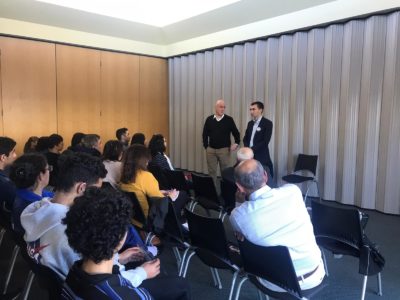
What is it that the government has against small businesses? Don’t they realise we are the lifeline of the economy? Why is it so hard and difficult for us to survive?” asked Rumy Balsara as he questioned the National Party candidate for Botany, Christopher Luxon.
The Q & A session held at St Columba Church, Botany was a gathering of the small but strong Zoroastrian [one of the world’s oldest religions] community that mostly resides in east Auckland. Interestingly, according to the last Census, there are around 2000 persons of Zoroastrian origin making it the smallest community in the country to celebrate their Parsee New Year on Sunday, August 16.
Organised by locals Rashna Tata and Bini Homavazir, the event had both Pakuranga MP Simeon Brown (who had just launched his campaign that morning) and Luxon answer a barrage of questions that ranged from changes in the education system to healthcare, the cannabis referendum, transport and small businesses being crushed by regulations.
“Why is it that we are put in the same category as multinationals when it comes to processes,” questioned Balsara, small business owner of Starlight Enterprises. He wanted to know how the National Party would do things differently.
“Ninety-five per cent of the businesses in New Zealand are small businesses, and both Simeon and I want small business owners at the heart of the Covid recovery,” said Luxon as he spoke about the National Party giving small businesses a shot in the arm with GST cash refunds and tax incentives to save jobs and boost investment.
Elaborating on the National Party’s JobStart scheme where businesses get $10,000 every time they hire a full-time person, Brown said, “Businesses will receive an initial $5,000 payment when the hire is made and the additional $5,000 will be handed over after the new worker had been employed for 90 days.”

Talking about “the economic tsunami our country has gone through” Luxon said a lot more jobs will be on the line once the government wage subsidies dried up.
“We are in some sort of sugar coma currently, but once the wage subsidy comes to an end a lot more companies will be having conversations with their employees about restructuring,” said Luxon, the former Air New Zealand CEO, who spoke about the need for a robust economy.
“The government certainly needs to spend money to stimulate the economy, but wasteful spending that piles up unnecessary debt means our capacity to respond to future crises is limited. Also, our kids and grandkids are the ones who will have to pay it off.”
On the subject of cannabis legislation for recreational use, both Brown and Luxon suggested that legalisation coupled with mental health and poverty could be a toxic combination for a generation.
Luxon spoke of how he felt the natural incentives for legalised marijuana companies would be to expand consumption by creating new products to reach different and new consumer segments. This was no different from what he had seen in other consumer goods categories.
He also expressed concern about how as an employer in a safety-sensitive industry could manage the risk of an employee being impaired. “Unlike alcohol, cannabis can stay in your system for up to three weeks, and as a former CEO of Air New Zealand where our number one priority was keeping our customers safe, it could have very serious consequences. You need to know none of your engineers working on aircraft are impaired by marijuana.”










